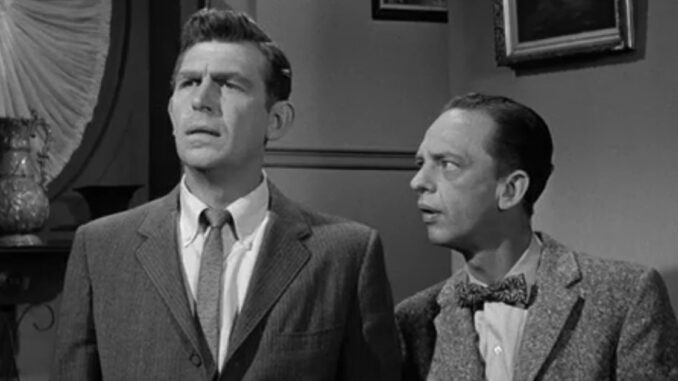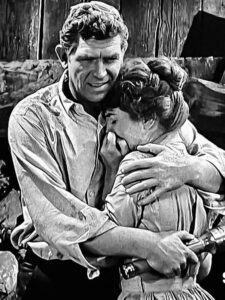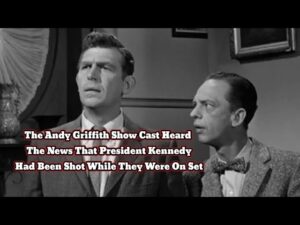
A Nation in Shock, Even in Mayberry
The assassination of President John F. Kennedy on November 22, 1963, stunned the world. From bustling cities to quiet towns like Mayberry, no corner of America was untouched by the tragedy. On the set of The Andy Griffith Show, a series known for its lighthearted depiction of small-town life, the news hit like a bolt of lightning.
A Moment Frozen in Time
For the cast and crew, it was supposed to be another day of laughter and camaraderie. Instead, it became one of somber reflection. How did this tragic event unfold on a set designed to be an escape from the harsh realities of the world?
How the Cast Learned the News
Breaking News Reaches the Set
In the early afternoon, as cameras rolled and scripts were rehearsed, word of Kennedy’s shooting began to trickle in. Back then, news didn’t spread with the immediacy it does today. The set was abuzz with whispers as radios and televisions were turned on in the background.
A Sudden Halt to Production
As confirmation of the President’s death came through, production on The Andy Griffith Show came to an immediate stop. The mood shifted from playful to heavy, with everyone on set struggling to process the magnitude of what had happened. Andy Griffith, Don Knotts, and the rest of the cast gathered together, their usual laughter replaced by silence and tears.

Andy Griffith’s Reaction to the Tragedy
The Leader of the Mayberry Family
Andy Griffith was not just the star of the show; he was its heart. Known for his calm and measured demeanor, Griffith offered words of comfort to the cast and crew. He encouraged everyone to take time to reflect and remember the gravity of the moment.
Griffith’s Personal Reflection
While Andy was a consummate professional, he later admitted that continuing to work under such circumstances was one of the hardest challenges he faced in his career. The tragedy weighed heavily on him, as it did on millions of Americans.
Don Knotts: The Show’s Comedic Genius Faces Reality
Don Knotts, known for his role as the bumbling yet lovable Deputy Barney Fife, was equally affected. Off-screen, Knotts was deeply empathetic and introspective. On this day, his usual humor and quick wit were subdued as he grappled with the loss of a national leader.
Knotts’ Take on the Day
In later interviews, Knotts reflected on how surreal it felt to go from filming comedic scenes to mourning a President. He believed it was a stark reminder of the delicate balance between entertainment and reality.
Ron Howard’s Childhood Memories
A Young Actor in a Historic Moment
Ron Howard, who played Opie Taylor, was only nine years old at the time. Though young, he could sense the gravity of the situation. Howard later shared that the day taught him a profound lesson about the unpredictability of life and the importance of unity in times of crisis.
Howard’s Recollection of the Cast’s Grief
Howard remembered how the adults on set, who usually made him laugh, were solemn and tearful. It was a moment that left a lasting impression on him, shaping his understanding of the world beyond Mayberry.
Production Resumes Amid National Mourning
Returning to Work After Tragedy
After a brief pause, the cast and crew resumed production. However, the atmosphere remained subdued. Filming comedic scenes in the aftermath of such a tragedy felt almost inappropriate, but the show’s creators believed that bringing laughter to audiences was more important than ever.
The Role of Entertainment During Difficult Times
The decision to continue filming was not made lightly. The producers recognized that in times of national crisis, television could provide a much-needed escape. The Andy Griffith Show became a comforting presence for viewers coping with their grief.

The Episode Filmed During the Tragedy
A Closer Look at the Day’s Script
The episode being filmed on that fateful day was later completed and aired without any direct reference to the assassination. However, viewers who knew the timeline often remarked on the underlying poignancy of the performances, as the cast had been deeply affected by real-world events.
Hidden Emotions in Plain Sight
Some fans speculate that the cast’s subdued energy during this episode reflects their emotional state. While the show maintained its usual charm, those who knew the context could see the quiet resilience behind the humor.
The Legacy of That Fateful Day
A Bond Strengthened by Grief
For the cast and crew of The Andy Griffith Show, November 22, 1963, became a shared moment of sorrow. The tragedy brought them closer, reinforcing their commitment to creating a show that brought joy to millions.
An Unforgettable Chapter in Television History
The day President Kennedy was shot remains a significant, albeit somber, chapter in the history of The Andy Griffith Show. It serves as a reminder of how entertainment and real life often intersect in unexpected ways.
Conclusion: A Day Mayberry Never Forgot
Even in a fictional town like Mayberry, real-world events could not be ignored. The day President Kennedy was assassinated left an indelible mark on The Andy Griffith Show and its cast. While the show continued to bring laughter and comfort to audiences, that fateful day served as a poignant reminder of the fragility of life and the unifying power of shared grief.
FAQs
1. Did the cast of The Andy Griffith Show ever discuss the assassination publicly?
Yes, in later interviews, several cast members, including Andy Griffith and Ron Howard, reflected on how the assassination impacted them on set.
2. Which episode was being filmed when JFK was shot?
The specific episode filmed on November 22, 1963, was not directly related to the assassination, but fans often point to subtle emotional undertones in that installment.
3. How did Andy Griffith comfort the cast and crew?
Griffith provided words of encouragement and allowed everyone time to process the news before resuming work.
4. Was production halted entirely after the news?
Production paused briefly to allow the cast and crew to absorb the shocking news, but it resumed shortly thereafter.
5. How did the audience respond to the episodes aired after the assassination?
Viewers appreciated the show’s ability to provide comfort and normalcy during a period of national mourning, highlighting the important role of entertainment in times of crisis.